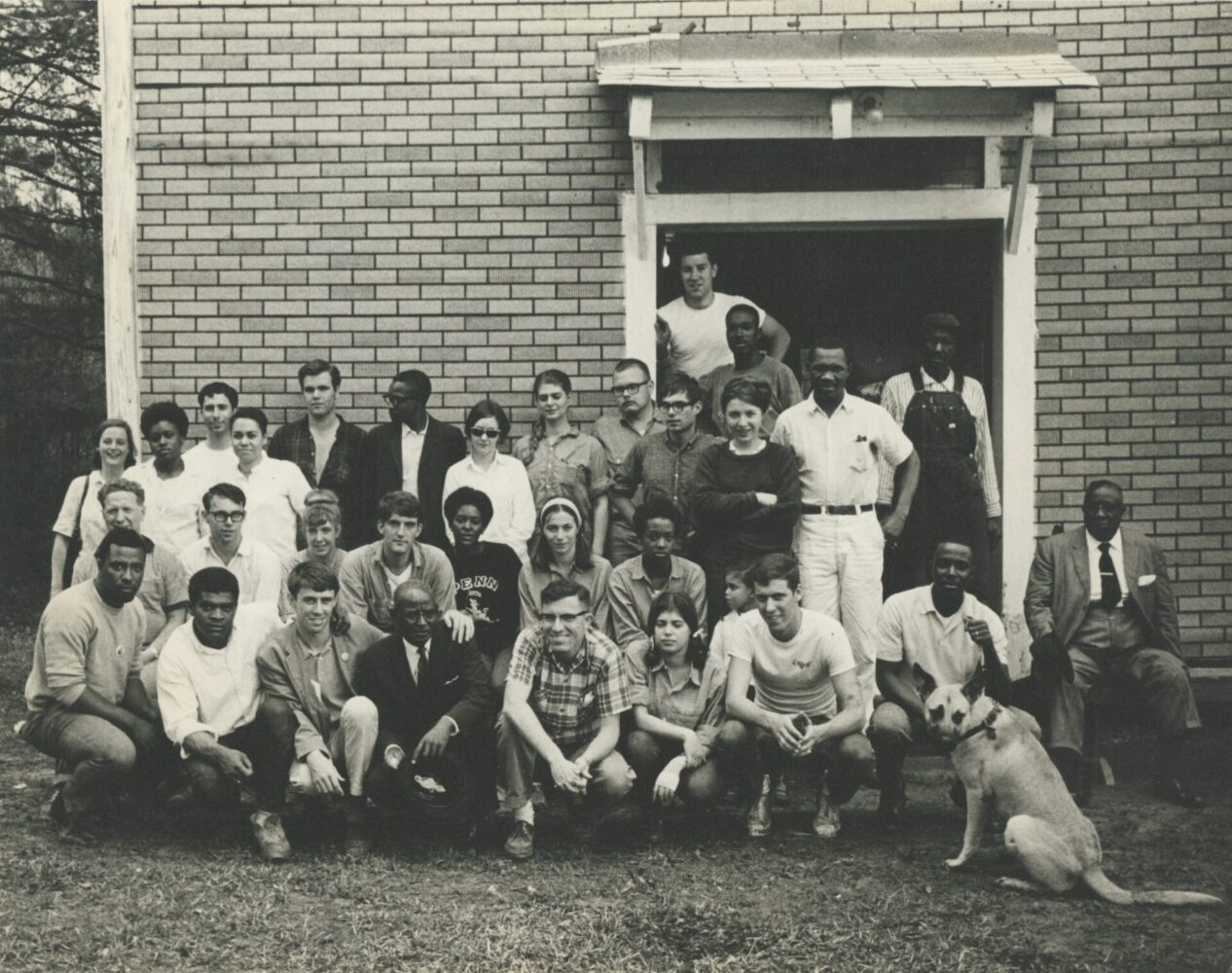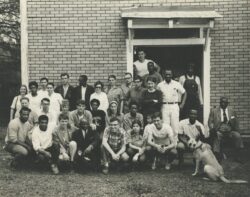Congress of Racial Equality (CORE) in Louisiana
Between 1960 and 1967 the Congress of Racial Equality (CORE) played a key role in Louisiana’s Black freedom struggle.

Ronnie Moore Papers, Amistad Research Center
CORE staff and volunteers in front of Freedom House in Jonesboro, Louisiana.
The Congress of Racial Equality (CORE) is a national civil rights organization that operated in Louisiana between 1960 and 1967. It played a key role in the state’s Black freedom struggle. CORE pioneered nonviolent protest in the North before turning to civil rights organizing in the Deep South. In the 1960s its members engaged in sit-ins and other forms of nonviolent direct action in several cities in Louisiana. The organization also engaged in voter registration drives and community organizing in rural Louisiana. By 1968 CORE was no longer active in the state, but it had greatly contributed to the successes of Louisiana’s civil rights movement.
CORE was founded in 1942 in Chicago by a small interracial group of pacifist college students. During World War II the organization pioneered nonviolent “sit-down” campaigns in Chicago and other northern cities to protest racial segregation in public facilities. Its members were devout believers in Indian civil rights activist Mohandas Karamchand (Mahatma) Gandhi’s philosophy of nonviolence and aimed to put his ideas about non-retaliation and redemptive suffering into practice. In 1947 CORE organized the Journey of Reconciliation, during which interracial teams of activists traveled through the upper South to test the Morgan v. Virginia (1946) Supreme Court decision, which declared segregation in interstate travel unconstitutional. Throughout the 1940s and early 1950s, however, CORE operated largely in obscurity and was confined to the North.
The Montgomery bus boycott allowed CORE to take on a more prominent role in the Black freedom struggle. The successful boycott also popularized nonviolent activism, which, in February 1960, led students in Greensboro, North Carolina, to launch a spontaneous sit-in movement that spread across the South, including Louisiana. CORE assisted the sit-in movement, offering student workshops in nonviolent direct action. The movement also allowed the organization to finally establish chapters in the region. The Freedom Rides of 1961 finally propelled CORE into the national spotlight. Modeled after the Journey of Reconciliation, members of CORE and the Student Nonviolent Coordinating Committee traveled by bus through the Deep South to test Boynton v. Virginia (1960), another Supreme Court decision that declared segregation in bus terminals and other interstate travel facilities unconstitutional. Mob violence against the activists gained national and international attention. It also helped CORE recruit thousands of new members in the Deep South.
Several of CORE’s new chapters were in Louisiana. The first chapter was founded in New Orleans in the summer of 1960 by Black students from Dillard, Xavier, and Southern Universities. Shortly thereafter white students from Tulane, Loyola, Newcomb College, and Louisiana State University also joined. By the end of that year, the chapter had organized widely publicized sit-ins and other forms of protest in the city. The New Orleans chapter became more prominent in 1961 when it housed and fed CORE’s Freedom Riders. CORE chapters in Shreveport, Baton Rouge, and other cities similarly challenged Jim Crow between 1961 and 1964. In Baton Rouge, for instance, seventeen Black students from Southern University staged widely publicized sit-ins at a lunch counter, drugstore, and Greyhound bus station in March 1960. All of them were arrested and expelled for their activism. Although CORE chapters tended to be led by Black people, their membership was interracial. Black women, including Doris Jean Castle, her sister Oretha, and Julia Aaron Humbles, played key roles in CORE’s Louisiana chapters and frequently took on important leadership positions.
However, CORE also operated in the state’s rural areas, where it organized large-scale voter registration drives and protested racial segregation. On occasion, the organization cooperated with the NAACP, which had been active in Louisiana since 1914 and was known for its campaigns against lynching and legal challenges to Jim Crow laws in the state. CORE’s voter registration campaign began in 1962 in the Sixth Congressional District, which included East and West Feliciana Parishes as well as Iberville and St. Helena Parishes. In 1963 and 1964 activists also began to organize in the state’s northeast. CORE’s key objective was to challenge Black disfranchisement and possibly affect the outcome of gubernatorial and presidential elections. The CORE activist Ronnie Moore played a key role in those campaigns. After being expelled from Southern University in Baton Rouge for his involvement in nonviolent protests in the early 1960s, the New Orleanian became a full-time field worker. Moore and fellow CORE activists believed their voter registration campaigns could also help convince Black Louisianans to become civil rights leaders in their communities. In almost all parishes, however, CORE faced stiff white resistance to voter registration and desegregation, which made progress difficult. After the passage of the Civil Rights Act of 1964 and the Voting Rights Act of 1965, the organization adjusted its approach and put more emphasis on community organizing, which included educational campaigns, medical programs, and economic programs meant to help Louisiana’s Black farmers gain more independence.
Unlike the widely publicized Freedom Rides or nonviolent demonstrations in New Orleans and other cities, CORE’s work in rural Louisiana initially remained largely invisible. It was also much more dangerous. Activists, local Black citizens, and even CORE leaders faced constant threats and violence from white supremacists. Despite segregationist violence, an increasing number of Black Louisianans became involved in civil rights organizing, but they frequently tested CORE’s traditional commitment to nonviolence. Many Black citizens refused to adhere to abstract nonviolent principles and instead chose to arm themselves to fend off attacks by the Ku Klux Klan and like-minded white people. In 1964 Black Louisianans in Jonesboro founded a formal self-defense organization—the Deacons for Defense and Justice—to protect CORE and local activists. Although the Deacons triggered vigorous discussions among CORE field workers, most of them came to accept self-defense as a necessity against the backdrop of unrelenting racist violence. Ultimately their experience in Louisiana contributed to CORE’s decision to abandon nonviolence and embrace Black Power in 1966.
By late 1966 CORE’s presence and influence in Louisiana had greatly diminished. The organization continued to support voter education projects in the state until 1967, but few staff members remained. By 1968 CORE was no longer active in Louisiana. Its demise was due to a confluence of factors, including the successes of the civil rights movement and the emergence of Black Power, which cost CORE white financial support and made Black citizens wary of nonviolence and interracial activism. However, CORE played a key role in Louisiana’s Black freedom struggle during its heyday.
